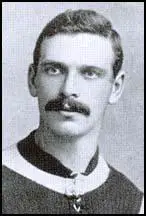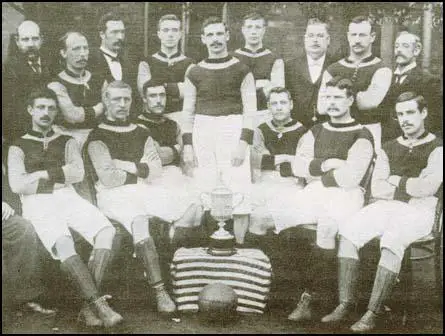John Devey

John Devey was born in Newtown, Birmingham, on 26th December 1866. He played for a variety of local teams before signing for Aston Villa in March, 1891. He was 24 years old at the time and some critics claimed that he "was too old to make an impact in the Football League".
In the 1891-92 season Aston Villa finished in 4th place to Sunderland. Devey had a great season ending up as top scorer with 29 goals in 25 games.
Aston Villa also had a good run in the FA Cup beating Heanor Town (4-1), Darwen (2-0), Wolverhampton Wanderers (3-1) and Sunderland (4-1) to reach the final against West Bromwich Albion. In his book, Association Football in Victorian England, Philip Gibbons argues that: "Villa dominated the early proceedings, with Athersmith and John Devey exerting pressure on the Albion fullbacks. However, the West Bromwich side soon responded as Billy Bassett passed to Roddy McLeod, who crossed the ball to the waiting Geddes. He shot towards the Villa goal and Warner failed to collect the ball clearly. It rolled between the Villa goalposts to secure a surprising one-goal lead for the Albion team."
Billy Bassett was also involved in WBA's second goal. He won the ball on the halfway line and after running at the Aston Villa defence he passed to Alf Geddes. His shot was saved but the goalkeeper could not hold onto the ball and Sammy Nicholls had the simple task of scoring from the rebound. Jack Reynolds scored the third with a shot from 25-yards. John Devey had to be satisfied with a runners-up medal.
Aston Villa finished in 4th place in the 1892-93 season. Once again Devey was the top scorer with 19 goals in 30 matches. As Tony Matthews points out in his book, Who's Who of Aston Villa: "He (Devey) could play in any forward position and there is no doubt that he was one of the finest goalscorers in the country in the 1890s... He never lacked initiative, but was a strong believer in combination, bringing in his fellow forwards and half-backs into the game as often as possible. He was exceptionally clever with his head as he was with both feet and often scored goals from distance when he caught the opposing goalkeeper off guard."
John Devey won his first international cap against Ireland on 5th March, 1892. Also in the England team that day was Dennis Hodgetts, Charlie Athersmith and Johnny Holt. England won the game 2-0. However, Devey failed to score and was dropped for the next game.
Aston Villa won the First Division of the Football League championship in the 1893-94 season. The club scored 84 goals in 30 games. The main contributors included John Devey (20), Dennis Hodgetts (12) and Charlie Athersmith (10). Defenders, James Cowan (centre-half), Jack Reynolds (right-half) and Willie Groves (left-half) were also key members of the team.

Howard Spencer, John Devey, Albert Wilkes, James Welford; front row, Charlie Athersmith,
Robert Chatt, James Cowan, George Russell, Dennis Hodgetts and Stephen Smith.
John Devey won his second international cap against Ireland on 3rd March, 1894. Also in the England team that day was Bob Holmes, Johnny Holt, Fred Spiksley, Joe Reader, Dennis Hodgetts and Jimmy Crabtree. Devey scored one of the goals in the 2-2 draw but surprisingly, this was the last international game that he played in.
In the 1894-95 season Aston Villa finished in 3rd place in the First Division of the Football League. The club scored 82 goals in 30 games. Top scorers were John Devey (19) Stephen Smith (13), Dennis Hodgetts (11), Robert Chatt (10) and Charlie Athersmith (9).
Aston Villa had victories over Derby County (2-1), Newcastle United (7-1), Nottingham Forest (6-2), Sunderland (2-1) to reach the 1895 FA Cup Final against West Bromwich Albion. The Villa outside-left, Robert Chatt, scored the only goal of the game after 39 seconds.
Aston Villa also won the First Division title in 1895-96. For the first time since he joined the club, Devey was not top scorer. He only scored 16 goals, whereas Johnny Campbell, who had been signed from Celtic, managed to net 26. Other members of these outstanding team included Dennis Hodgetts, Charlie Athersmith, James Cowan, John Cowan, Jack Reynolds, Jimmy Crabtree, Howard Spencer and Stephen Smith.
As Philip Gibbons pointed out in Association Football in Victorian England: "Aston Villa had twice won the League Championship, as well as the FA Cup, during the three previous seasons, with a team generally acknowledged as the finest in the land."
Aston Villa retained the title the following season by beating the runners-up, Sheffield United, by an amazing 11 points. Aston Villa scored 73 goals that season with Devey adding 17 to his total. Other contributors included George Wheldon (18), Johnny Campbell (13), Charlie Athersmith (8), John Cowan (7) Stephen Smith (3) and Jack Reynolds (2).
On 30th January, 1897, Aston Villa beat Newcastle United 5-0 in the third round of the FA Cup. They went onto beat Notts County (2-0), Preston North End (3-2) and Liverpool (3-0) to reach the final against Everton.
A crowd of 60,000 arrived at Crystal Palace to watch the final. Charlie Athersmith scored the opening goal but Everton hit back with goals from Jack Bell and Richard Boyle. Aston Villa continued to dominate the game and added two more from George Wheldon and Jimmy Crabtree. That finished the scoring and therefore Aston Villa had emulated the great Preston North End side that had achieved the FA Cup and Football League double in 1888-89 season.
Before the beginning of the 1897-98 season, Aston Villa lost the services of Johnny Campbell and Jack Reynolds, who both decided to join Celtic in the Scottish League. During the opening month of the campaign, Howard Spencer sustained a serious leg injury that kept him out of the team for the rest of the season. Aston Villa missed these three key players and could only finish in 6th place in the league. They was also knocked out of the FA in the first round by Derby County.
During this period the Football League imposed a maximum wage of £4 a week. At the time, most players were only part-time professionals and still had other jobs. These players did not receive as much as £4 a week and therefore the matter did not greatly concern them. However, a minority of players, were so good they were able to obtain as much as £10 a week. This proposal posed a serious threat to their income.
Some of these top players joined together to form a trade union. This included John Devey, Bob Holmes and Jimmy Ross of Preston North End, John Somerville of Bolton Wanderers, Hugh McNeill of Sunderland, Harry Wood of Wolverhampton Wanderers and John Cameron of Everton. Other players who took a leading role in the union included Tom Bradshaw (Liverpool), James McNaught (Newton Heath), Billy Meredith (Manchester City), John Bell (Everton), Abe Hartley (Liverpool), Johnny Holt (Everton) and David Storrier (Everton).
In February 1898, these players announced the formation of Association Footballers' Union (AFU). Jack Bell became chairman of the union. The secretary of the AFU, John Cameron, announced that the union had 250 members. Cameron pointed out that their main objective was that they "wanted any negotiations regarding transfers to be between the interested club and the player concerned - not between club and club with the player excluded". John Devey added: "We're not taking up the question of wages and we are not talking any strike business."
Devey also played county cricket for Warwickshire (1888-1897) scoring over 6,500 first-class runs including eight centuries.
Aston Villa was back in form in the 1898-99 season. Two new players emerged that season: George Johnson and Billy Garraty. However, it was John Devey who was the star of the side scoring 21 goals in 30 games. George Wheldon also did well with 16 in 33. Villa once again won the league title, with Liverpool taking the runners-up spot. league title for the 4th time in 6 years.
Aston Villa confirmed it was the best club in England during the 1890s when it won the First Division championship the following season. This was their fifth league title in seven years. During this period they had also won the FA Cup twice (1895 and 1897). Billy Garraty was the top scorer in league and cup games in the 1899-1900 season with 31 goals. He was followed by John Devey (18), George Wheldon (13), Stephen Smith (7), George Johnson (6) and Charlie Athersmith (4).
John Devey was also the club's top goal scorer in the 1900-01 season with 15 goals. Devey was now 37 years old and he lost his place in the 1901-02 season. By the time he retired he had scored 186 goals in 308 appearances.
In June 1904 Devey was appointed as a director of Aston Villa. It was a post he held for the next 30 years. He also ran a sports outfitter's shop in Lozells. During the First World War he joined forces with another famous Villa player, Harry Hampton, to establish the Winston Green Picture House Company. In 1915 they opened a 1500-seat cinema in Birmingham.
John Devey died in Aston on 13th October 1940 and left an estate worth over £2,000.
Primary Sources
(1) Tony Matthews, Who's Who of Aston Villa (2004)
He (Devey) could play in any forward position and there is no doubt that he was one of the finest goalscorers in the country in the 1890s. A close dribbler with good pace (when required), Devey was alive to every movement on the field and possessed the rare gift of "intelligent anticipation". He never lacked initiative, but was a strong believer in combination, bringing in his fellow forwards and half-backs into the game as often as possible. He was exceptionally clever with his head as he was with both feet and often scored goals from distance when he caught the opposing goalkeeper off guard.
(2) Adam Ward, The Essential Aston Villa (2002)
John Devey was the captain of Aston Villa's great teams of the 1890s and, during an 11-year spell as a Villan, he led the club to two FA Cup successes and five league championships... Devey's big problem was Archie Hunter. He was a similar player to the Scotsman, and for many years it appeared that the lad from Lozells would never get the chance to wear the colours of his local team... The critics said that at the age of 24 John was too old to make an impact in the Football League, but after scoring two goals on his debut he ended the season with a respectable haul of 13 goals and was soon picked to play for England against Ireland.
(3) Graham McColl, Aston Villa: 1874-1998 (1998)
John Devey was captain of Villa during their great triumphs of the 1890s. Birmingham-born Devey was a standout as an inside-forward, his intelligent, stylish play bringing him 187 goals in 306 games. He won five First Division championship medals and two FA Cup winners' medals during his ten-year career at the club.
